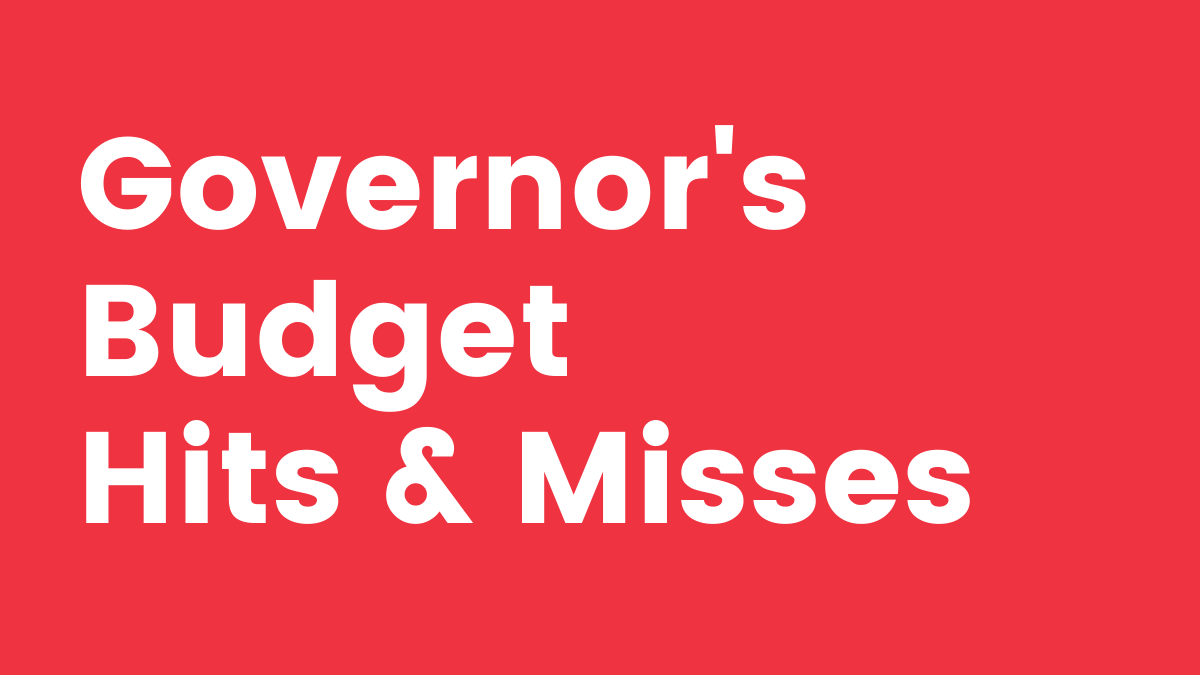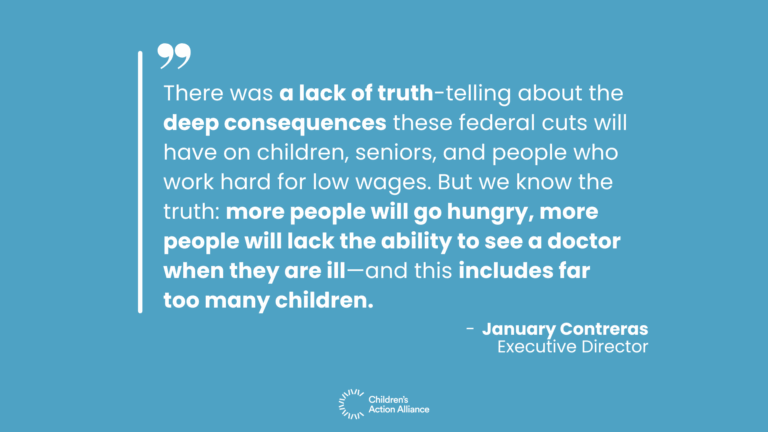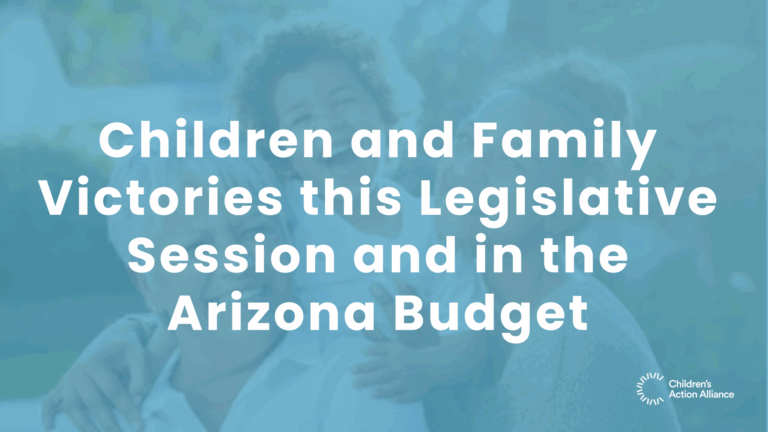
2022 Governor's Budget Hits & Misses
Each year, Arizona’s legislative session begins with the Governor’s State of the State speech and the unveiling of his or her annual priorities and proposed budget. This session presents Governor Ducey a rare opportunity in his final year in office to provide much-needed help to children and families in Arizona. Despite the lingering pandemic, Arizona’s revenues have reached historic highs in large part due to the multiple federal economic rescue packages and temporary unemployment insurance expansion. Arizona currently has $1 billion in ongoing and $2.1 billion in one-time revenues. This is in addition to billions of dollars in unspent federal COVID relief dollars.
Also at the beginning of each year, Children’s Action Alliance publishes its list of legislative priorities. It is our hope each year that the Governor's priorities align with ours. This year, while we did see a few bright spots that address longstanding needs, that largely did not happen. Take a look at a comparison of where the Governors priorities and ours find common ground, and where opportunities missed the mark or weren’t addressed.
On mobile? View our printable PDF.
Early Childhood
 |
Secure state general fund investment in child care assistance Not addressed in the Governor’s budget or State of the State. |
 |
Increase Arizona Early Intervention Program provider rates Nearly 11,000 children under the age of 3 who have disabilities or developmental delays receive therapies and other support from the Arizona Early Intervention Program. Current rates paid to providers are significantly below comparable rates paid by the program that provides services to children over age 3. The Governor’s budget proposal adds $18.6 million per year starting in fiscal year 2024 to bring the rates in line with rates paid by other programs. A temporary rate increase will be funded in fiscal year 2023 using federal dollars. |
 |
Secure state investment in Healthy Families home visitation program The Governor’s budget provides $10 million, of which $7.5 million is new funding and $2.5 million replaces funds that will no longer be available. Healthy Families currently serves 4,000 families. The Governor’s budget would add an additional 1,500 families. The Governor’s budget also includes a total $15 million for fiscal years 24 and 25 which would increase the program’s ability to serve 8,000 families. |
 |
Fight any use of state funds appropriated for online early education Not addressed in the Governor’s budget or State of the State. |
Education
 |
Prevent a $1.2 billion cut to public schools by authorizing an annual exemption to the K-12 expenditure cap for this school year by March 1 If the legislature does not override the education spending limit by March 1, 2022, Arizona’s district schools will be required to cut their current year budgets by $1.2 billion. This issue is not addressed in the Governor’s budget or State of the State. |
 |
Refer a measure to the ballot to update or eliminate the outdated K-12 expenditure authority. Not addressed in the Governor’s budget or State of the State. |
  |
Expand access to affordable higher education and prevent increases in student debt The Governor’s budget proposal increases the Promise Grant funding by $12.5 million for a total $20 million. These additional dollars will serve an additional 3,300 students. The Promise Grant program covers the balance of tuition that remains for students who are fully eligible for Pell grants. The Governor’s budget, however, continues to suspend $10 million of the statutorily required deposit into the Student Financial Aid Trust Fund. This issue is not addressed preventing tuition increases. |
 |
Reduces inequities in school funding The Governor’s proposal increases results-based funding for excelling schools by $60.8 million for a total $129 million. The Governor’s proposal also includes moving this funding into the Basic State Aid appropriation where it will lose its separate identity. Schools continue to receive results-based funding as long as they meet the criteria. For struggling schools the Governor’s proposal includes $58 million to create the Operation Excellence program which provides $150 per student for three years. |
Family Health
 |
Extend postpartum Medicaid coverage to 12 months (currently 60 days) Approximately 15,000 to 18,000 pregnant adults could benefit from extended AHCCCS coverage. This issue is not addressed in the Governor’s budget or State of the State. |
 |
Comprehensive adult dental coverage through Medicaid Currently only a maximum of $1,000 annually of emergency services are available for most adult populations. This issue is not addressed in the Governor’ budget or the State of the State. |
 |
Streamline Young Adult Transitional Insurance (YATI) re-enrollment for former foster youth Young adults who “age out” of foster care at age 18 are automatically eligible for enrollment in AHCCCS, the state’s Medicaid program. If they do not respond to redetermination notices or requests for additional information, often because AHCCCS does not have an accurate address, they are disenrolled. More than 5,200 young adults are currently enrolled through YATI. This issue is not addressed in the Governor’s budget or State of the State. |
Children's Health
 |
Waive the Medicaid five-year residency requirement for otherwise eligible pregnant people and kids who are lawfully present immigrants Between 7,000 and 11,000 Arizona children are ineligibility for the state’s health insurance program because they have not been in the US for at least five years. This issue is not addressed in the Governor’s budget or State of the State. Adopting the Immigrant Children’s Health Improvement Act (ICHIA) option would allow the state to provide high-quality health coverage to these children and to receive a higher federal reimbursement for their care. |
 |
Provide 12-month continuous enrollment for children participating in AHCCCS or KidsCare More than 850,000 Arizona children are enrolled in Arizona’s Medicaid or CHIP programs. Though children who qualify are eligible for 12 months, families who experience income volatility may lose coverage due to a temporary or one-time increase. This has a negative impact on children’s health outcomes and presents an administrative burden to both AHCCCS and the families who lose coverage. This issue is not addressed in the Governor’s budget or State of the State. |
 |
Eliminate three-month wait period for KidsCare enrollment Arizona’s KidsCare program requires a child cannot be covered by any health insurance for three months prior to enrollment. This presents a barrier to enrollment. Even short lapses in health insurance coverage have a negative impact on children’s health outcomes. This issue is not addressed in the Governor’s budget or State of the State. |
Child Welfare & Juvenile Justice
 |
Increase kinship foster care stipend The Governor’s proposal quadruples the unlicensed rate from $75 to $300 per month and also increases the daily allowance that pays for clothing, school supplies, etc. This increase adds $19.8 million for a total $24.8 million for kinship placements. |
 |
Reduced barriers to licensure for foster care and kinship care providers Licensed foster care providers receive more than $600 a month compared to the current $75 for unlicensed kinship providers. The Governor’s budget proposes removing barriers to licensure for kinship caregivers while maintaining home life and safety standards. |
 |
Increase the independent living subsidy provided for youth in extended foster care Currently, 651 former foster youth between ages 18 and 21 receive the independent living subsidy. Currently the maximum subsidy is $715 and is reduced by $50 every six months. Neither the Governor’s budget nor the State of the State address this issue. |
 |
Reduce or eliminate juvenile court fines and fees This issue is not addressed in the Governor’s budget or State of the State. |



